Another day, another thing to worry about, right?
Is your precious little angel suddenly grinding, clenching or gnashing their teeth? Baby grinding teeth is a common condition that for the most part is not a serious problem.
Babies tend to outgrow it, but you can still do plenty to reduce the negative impact.
Baby grinding teeth, otherwise known as bruxism, is usually harmless, but in some cases it can cause pain and discomfort. In more extreme cases, it can even damage the teeth.
Now, we’re not trying to scare you, but it’s important to consider everything.
This in-depth guide aims to provide all the information you need about this condition.
Specifically, we strive to explain what baby grinding teeth is, the symptoms and the risks involved, as well as the best treatment and prevention options parents have at their disposal.
What Is Bruxism and What Causes It?
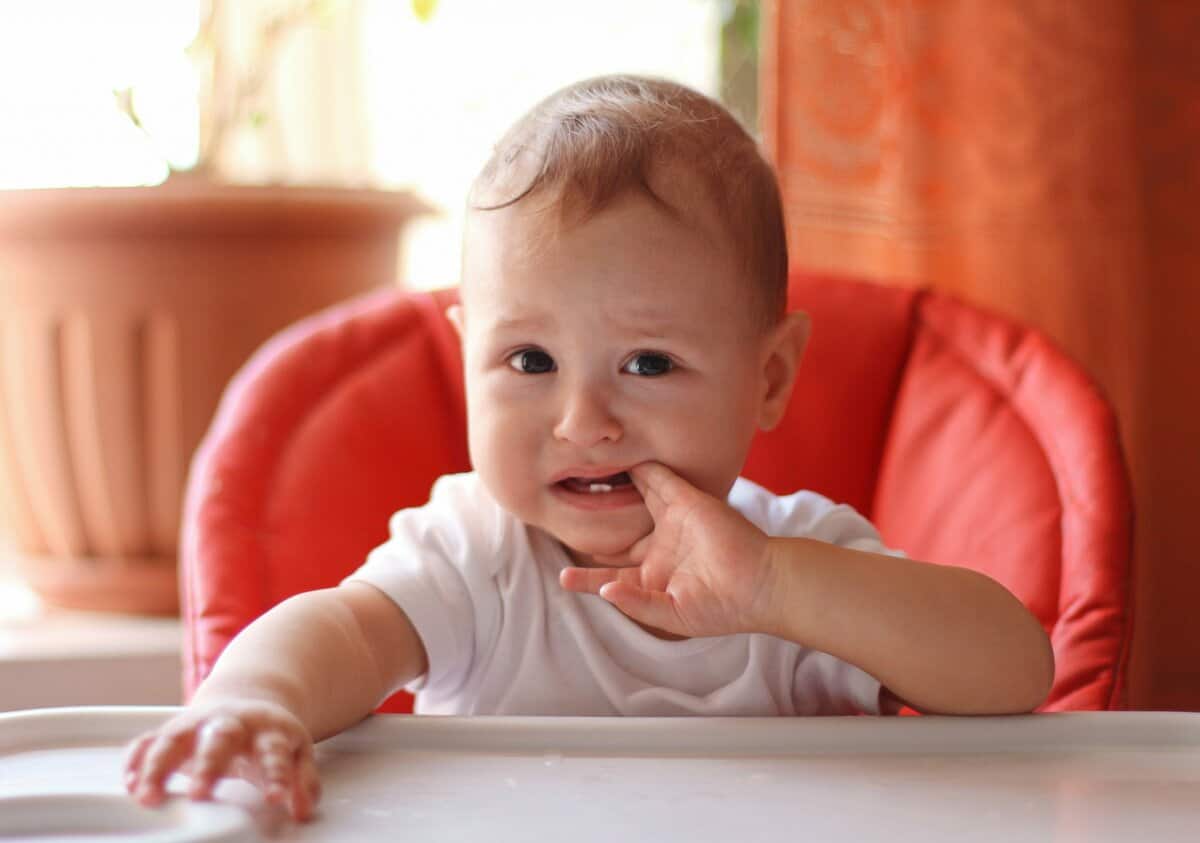
Baby grinding teeth becomes less common with age, but bruxism also affects adults.
It’s not a condition that’s exclusive to infants and young children.
While the involuntary grinding, clenching and gnashing of teeth is primarily sleep-related, bruxism can affect your baby or even an adult while they are fully awake, too.
But, why do babies grind their teeth?
Usually, baby grinding teeth affects babies and toddlers between the ages of 6 months to 3 years. The condition eventually subsides and disappears altogether – but not always.
In some cases, teeth grinding persists and just won’t go away.
Now, we don’t necessarily know why baby grinding teeth happen.
However, as of writing this article, the current medical studies and research indicate that bruxism is caused by a combination of factors that are closely linked with emotions.
Let’s take a moment to examine these factors:
• Teething is understood to cause bruxism.
In fact, it’s likely the most common cause of baby grinding teeth.
Due to the baby’s teeth erupting from the gums, they experience pain and discomfort. Because of that, babies tend to be more irritable, and fussier, often refusing to sleep.
It’s a difficult period for parents as they work to ease the symptoms by providing teething toys and cold objects. In certain cases, babies need to take over-the-counter medication.
Teething usually begins at 6 months old, which coincides with teeth grinding.
It takes around two years for the teething to subside, but the pain is not constant.
As teething symptoms lessen, your baby will likely stop grinding their teeth, too.
• Babies sense and respond to stress.
It’s believed that stress and anxiety are common causes of bruxism in adults, but what about babies? Well, it’s difficult to say to what degree, if any, babies experience stress.
What we do know, however, is that children react to stressful situations.
Children observe their parents’ reactions and facial expressions. That’s how they respond to the world and what’s going on around them. Your baby is stressed if you’re stressed.
However, there are other stressful circumstances for newborns.
For example, separation anxiety can lead to behavioral changes, such as crying and sleep disruptions. As such, it’s believed that separation anxiety contributes to teeth grinding.
More so, sudden and unpredicted changes to their routine can also cause children to become stressed and to react by crying as a way to cope with the ongoing changes.
Loud noises, and bright lights – all of this contribute to the condition of baby grinding teeth.
Parents, therefore, have to stay mindful of what causes their baby to become stressed.
The best way to go about it is to make sure that your baby is always safe, comfortable, and happy. A calming environment goes a long way toward preventing bruxism in infants.
• An abnormal bite is linked with bruxism.
An abnormal bite, also known as malocclusion, basically implies that the upper and lower teeth do not meet correctly. This misalignment of teeth can cause a few dental problems.
One of those dental problems is baby grinding teeth.
In case of an abnormal bite, parents need to consult with a pediatrician for guidance.
There are a few different causes of malocclusion, the most common of which include genetic predispositions and dental traits, thumb-sucking and prolonged use of a pacifier.
Since malocclusion causes tension in the jaws, children resort to clenching their jaws and grinding their teeth, whether unconsciously during sleep or awake, to relieve tension.
Generally, orthodontic treatment is required to correct the alignment.
If your baby has an abnormal bite, then there’s good reason to believe that it’s linked, if not the very cause, of bruxism. In this case, you need to consult with a pediatrician.
• Medical conditions.
Underlying medical conditions sometimes cause teeth grinding in infants.
Depending on the condition, discomfort in the mouth or jaw can cause teeth grinding.
Some of the most common conditions include ear infections and sleep apnea.
Naturally, there’s a variety of medical conditions that can, in theory, be linked with baby grinding teeth, but we won’t examine them all. It’s just something for you to consider.
If you have any concerns or suspicions that there may be an underlying medical condition that’s causing your baby to grind their teeth, seek medical guidance as soon as possible.
Identifying the Symptoms of Bruxism
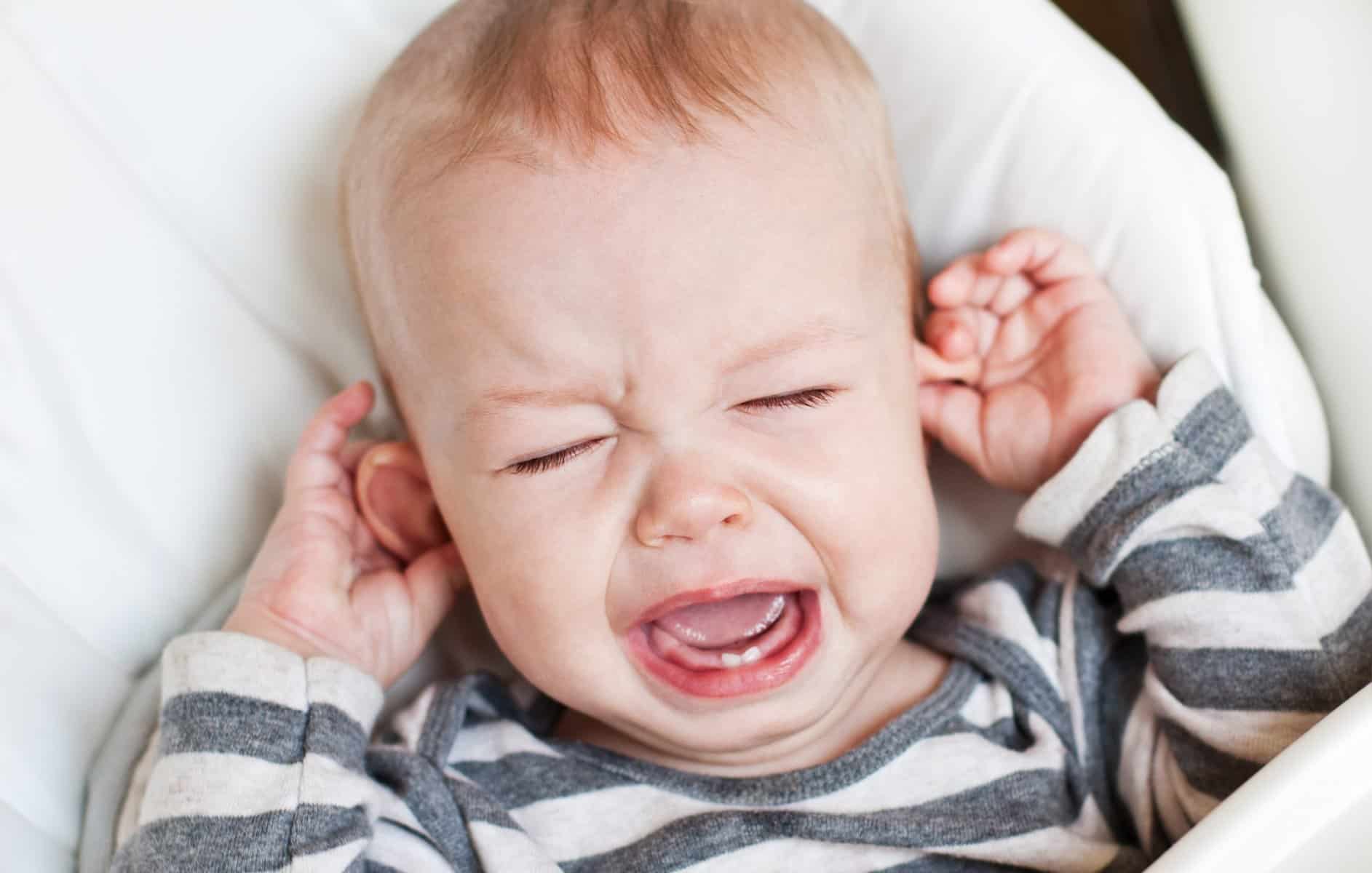
Baby grinding teeth is a relatively common condition.
Up to 30% of children are affected by bruxism at some point in their childhood.
Teeth grinding is a condition that’s more common in young children, but that doesn’t mean that adults are immune. However, for some reason, it seems to afflict boys more than girls.
Either way, parents need to learn to identify the symptoms.
• Do you hear any grinding sounds?
When children grind their teeth, it’s very audible. In fact, it’s harder not to notice it.
The sound of a baby grinding teeth at night is unmistakable. It can be heard from the other side of the room. The friction sounds unnatural, and it’s sure to draw your attention.
Depending on how hard they clench their jaw, the sound can be either high-pitched or low-pitched. To describe it, the sound is faintly similar to that of nails scratching a chalkboard.
If you happen to hear it, then there’s no doubt at all that your baby has bruxism.
However, not all children grind their teeth loudly. Some do it silently, making it difficult for parents to notice it. So, you must be mindful of other symptoms of baby grinding teeth.
• Check for facial pain and soreness.
The constant pressure and friction can cause pain for a baby or a toddler.
In fact, the affected area of the ceaseless jaw clenching and tooth grinding may become sensitive to touch. Check for pain and discomfort in the jaw muscles, cheeks, and ears.
Teeth grinding in infants is known to cause mild pain, so your baby will likely go through behavioral changes. Their sleeping and feeding patterns may likely alter, as well.
In general, teeth grinding can make babies irritable and fussy.
However, you’re not helpless. There’s much you can do to help your baby.
With slow and gentle movements, you can massage the affected area and loosen up any tension or tightness that may have been created in the muscles affected by bruxism.
There’s much you can do, and baby grinding teeth will probably be temporary.
However, if the condition persists or becomes too severe, seek medical guidance.
• Check your baby’s teeth.
If left untreated for too long, certain cases of bruxism inevitably lead to tooth wear.
This includes a range of damage, such as chipping and cracking. In some severe cases, bruxism can even result in a loss of teeth, which is a rather destructive consequence.
Over time, the damage adds up and leads to attrition.
Therefore, parents have to familiarize themselves with the symptoms of bruxism to spot it early. Even so, make sure to schedule regular dental appointments for your baby.
Check-ups at the dentist help kids maintain optimal dental hygiene.
If you suspect your baby might be suffering from teeth grinding, the first thing you should do is check your baby’s teeth for any sign of chipping or cracking.
• Are your baby’s teeth sensitive?
Tooth sensitivity is practically an unavoidable symptom of baby grinding teeth.
It happens as a direct consequence of teeth grinding and friction contact. The protective enamel wears off, exposing the underlying dentin and resulting in tooth sensitivity.
When that happens, children start to experience discomfort in hot or cold temperatures.
They resist certain types of foods, especially sweet or acidic foods.
In some cases, their teeth start to hurt when exposed to cold air.
Naturally, the severity of tooth sensitivity varies on the condition’s intensity. Some babies experience occasional discomfort, while other babies experience constant stings.
Luckily, pediatric dentistry has all the treatments available to ease tooth sensitivity and to help your child overcome teeth grinding, and to ensure future prevention on top of that.
• Does your baby have a headache?
Both in young children and adults, this condition causes headaches.
Especially in the morning, after a whole night of subconscious baby grinding teeth, your child may show subtle signs of a headache. Yes, even newborns experience headaches.
However, since they can’t outright tell you, they communicate it differently.
For example, your child may act fussier than usual. On top of that, they may hold their head more than usual, cry more than usual, and withdraw from everyday activities.
You may even notice them closing their eyes to shut away external stimuli.
• Other symptoms and a quick recap.
If baby grinding teeth happen to your child, consult a pediatric dentist.
However, knowing the symptoms allows parents to identify the condition on time.
Let’s do a quick recap of all the symptoms, including uncommon ones:
- Teeth grinding sounds.
- Facial pain and soreness.
- Damage to baby’s teeth.
- Increased tooth sensitivity.
- Headaches.
- Jaw pain.
- Fussiness and restlessness.
- Difficulty falling asleep.
- Chewing and biting.
Okay, so What Are Your Options?
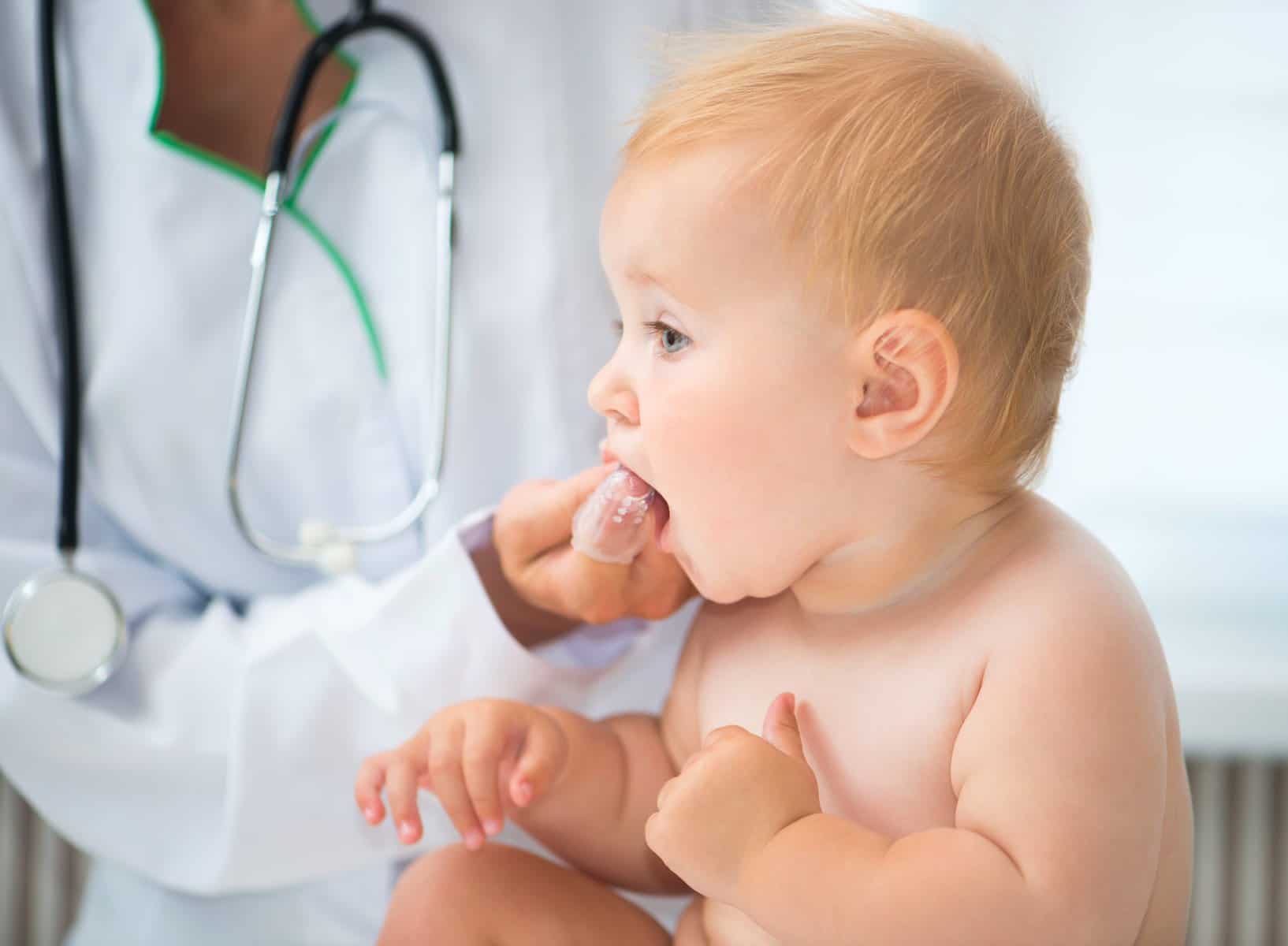
Bear in mind that in the majority of cases, you have nothing to worry about.
However, as a responsible parent, you want to do everything in your power to make sure that your child experiences no discomfort and that they get good treatment, if necessary.
If the symptoms are mild, the medical advice you receive will likely be a recommendation just to wait and see. As stated previously, most children quickly outgrow this behavior.
The symptoms pass, and tooth grinding stops. But what if it doesn’t?
After all, why do babies grind their teeth, to begin with?
Well, there could be an underlying cause.
If the dentist spots an underlying issue, you need to address it.
However, this varies from providing teething toys to relaxation techniques. Follow the medical advice you receive and make sure to take your child in for regular check-ups.
Baby grinding teeth is a common condition, but it’s still unknown territory.
In other words, we don’t know exactly what causes it. All we have is guesswork.
Still, certain strategies and techniques have been proven efficient in reducing the intensity of symptoms, such as relaxation techniques that work to destress and calm your baby.
This includes swaddling, gentle rocking, massages and even singing lullabies.
In some cases, especially if teeth grinding in infants persists for too long, dental treatment may be required. If so, listen to what the dentist says and follow their advice.
Sometimes, a splint is necessary, for example, to reposition the jaw and reduce tension, but we’re talking about extreme cases of bruxism which have been untreated.
While this condition usually fizzles out, that’s not always the case.
Some children have to undergo tooth repair or restoration. If a particular tooth has been damaged, the dentist will likely recommend tooth repair as an adequate solution.
In situations like this, a child may have to undergo orthodontic treatment, as well. The idea behind it is to correct the alignment of the teeth by use of braces or similar tools.
In sporadic cases, medication may be prescribed.
All in all, there are plenty of options for treatment, so you have nothing to worry about. After all, the most important thing is to be able to spot the symptoms early.
In Conclusion
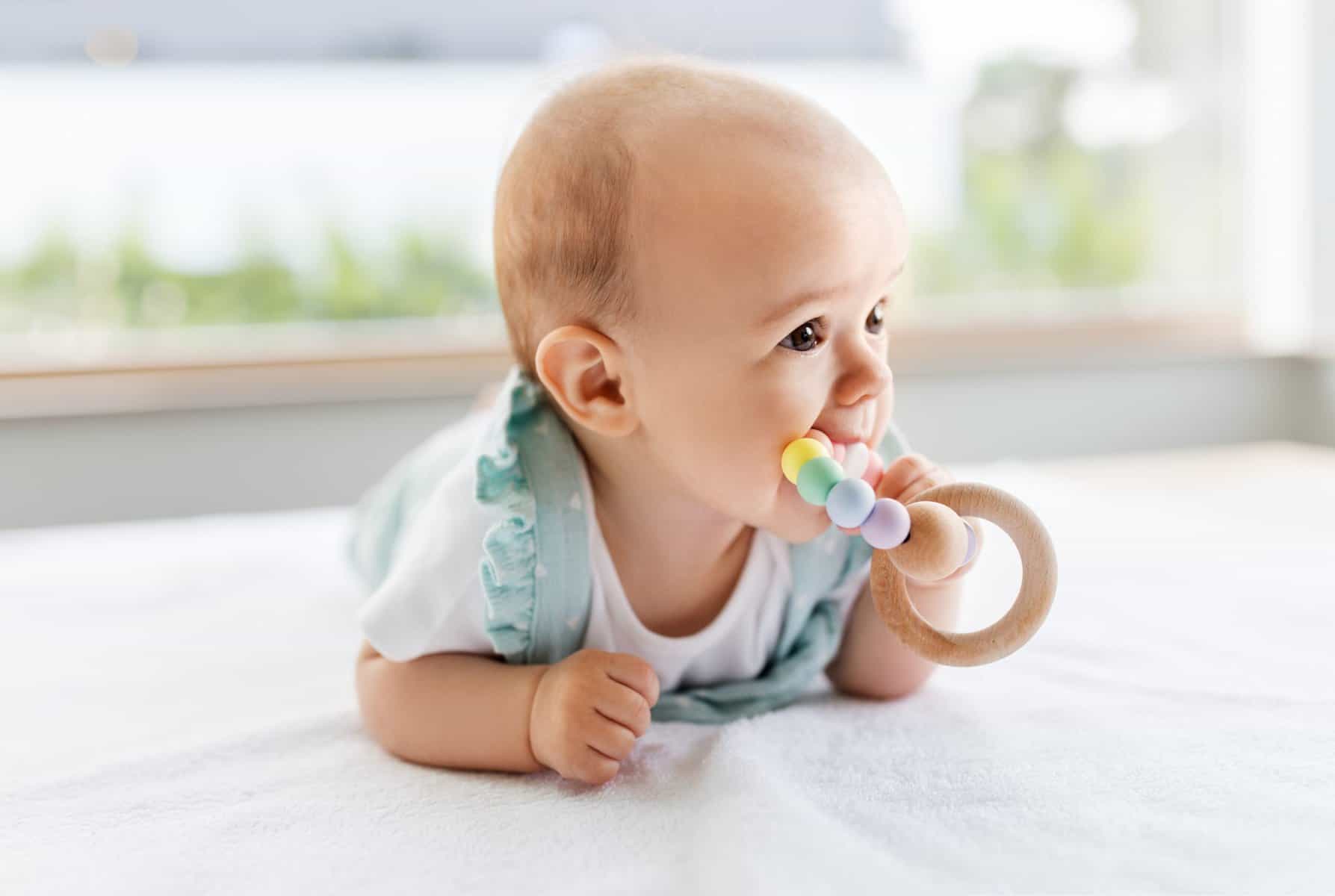
Baby teeth are sensitive in development, and they need to be protected.
But, why do babies grind their teeth?
This issue is common in many kids, but that won’t give you any peace of mind.
You’re a parent and you worry – possibly too much for your own good. We’re hardwired that way. However, with the help of pediatric dentistry, you have nothing to worry about.
Even though we don’t know the exact cause, effective treatments exist.
You can help your baby by monitoring its symptoms and following medical guidance.
There’s a variety of treatments and strategies that you can do at home to help your child by reducing discomfort, but if the situation worsens, schedule a dentist’s appointment.
Work closely with your doctors as you take proactive steps to help your baby overcome bruxism and promote healthy oral habits to keep their teeth in good condition.

Mother of three and a primary school teacher. I’ve always loved being around children and helping them, so I chose my path as a teacher. It is sometimes hectic with three children, but I am 100 percent into it and wouldn’t change it for anything in the world.

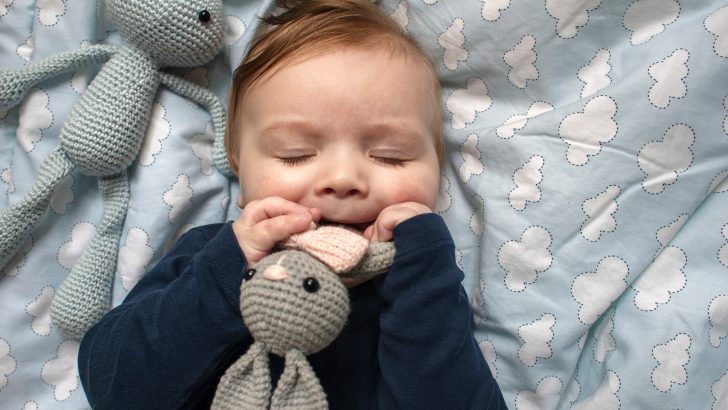
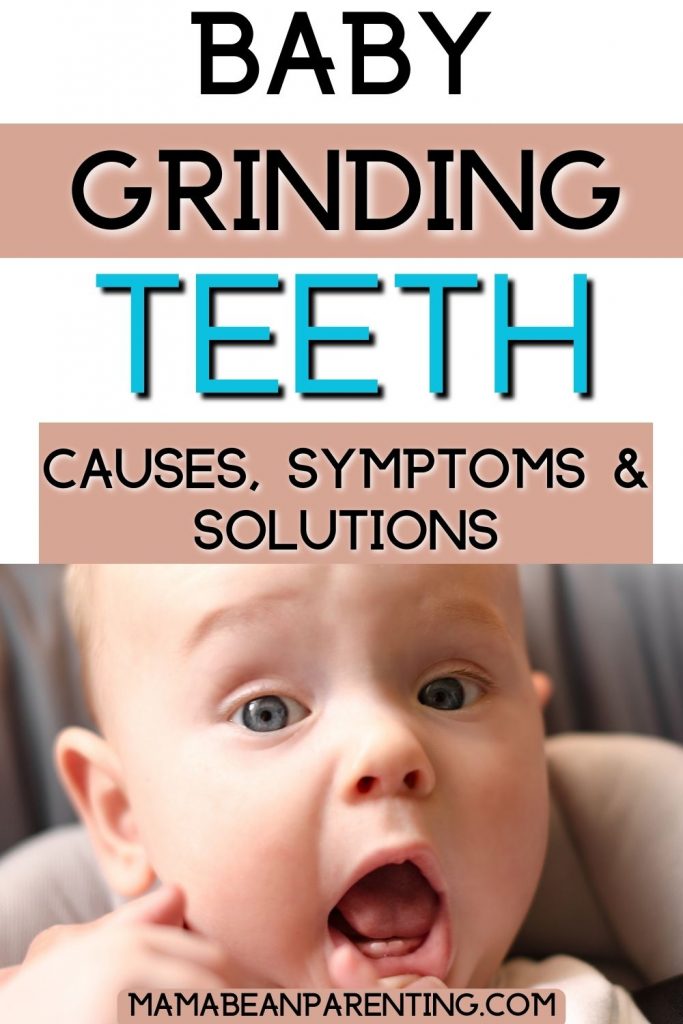
How to Brush Toddler Teeth • Mama Bean Parenting
Thursday 20th of April 2023
[…] If anything, this period will be your greatest test of patience so far. Sometimes, teething may cause your baby to start grinding their teeth. […]
Can You Freeze The Formula For Teething? • Mama Bean Parenting
Monday 13th of March 2023
[…] the future, you will deal with babies grinding teeth or kids’ yellow teeth. It’s always […]
Baby's Poop Smells Like Vinegar: The Reasons Behind It • Mama Bean Parenting
Wednesday 1st of March 2023
[…] he teething period is always full of unusual things. Some babies even grind their teeth. […]